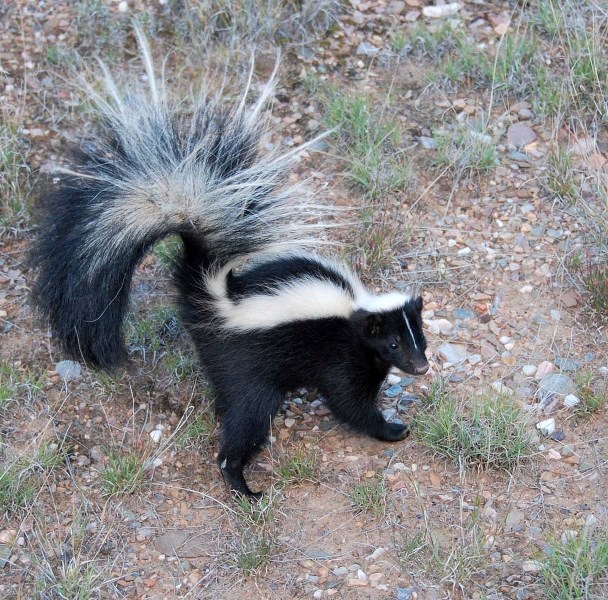For Jerry Dragoo, it was love at first skunk.
A biologist at the University of New Mexico, Dragoo has been studying skunks since the early 1980s.
He recalls getting sprayed by the first one he caught. "I said, well, this ain't so bad. I don't know what everyone's complaining about."
Three days later, he still stunk so bad that his co-workers wouldn't let him into the museum, he recalls, laughing.
Dragoo is a self-declared "mephitologist" and head of the Dragoo Institute for the Betterment of Skunks and Skunk Reputations. A renowned authority on skunks, he was instrumental in getting them reclassified as their own evolutionary family (they used to be considered weasels) and runs an informal skunk sanctuary.
Skunks are relatively uncommon cat-sized mammals found throughout North America. They are infamous for their ability to blast their opponents with a stinging, smelly spray that seems impossible to wash away.
The ones we get here in St. Albert are striped skunks, which are black with a big white stripe on their back.
"It's probably the most recognizable mammal in North America," Dragoo says. You might mistake one for a cat, but the tail on a skunk is a lot bushier. Skunks also have long, non-retractable claws for digging.
Local naturalist Elke Blodgett says she once had a skunk living under her house. Wanting it gone (as it would likely stink up the place when it got mad at local dogs), she recalled how a neighbour made peace with a skunk by feeding it dog food.
"He loved chicken bones," she recalls, and it eventually moved on. When it did, she boarded up the hole it had snuck into and it never came back. "He never sprayed, and I'm quite happy with that."
The striped skunk can typically be found in abandoned dens or under porches, notes Hinterland Who's Who. It lines its den with leaves, which it collects by gathering under its body and shuffling along with the leaves between its legs.
Striped skunks are omnivorous and use their long claws to dig up mice and grubs, Hinterland Who's Who reports. Although they can raid henhouses and beehives (they eat bees), about 70 per cent of their diet consists of species we humans consider as pests.
Fearless stinkers
Skunks are best known for their stinky spray, which they can shoot accurately at a distance of up to three metres.
Retired Sturgeon County pest control officer Harley Coleman says he's been blasted by a few skunks in his time. "It's rough, especially on the eyes," he says, and burns your skin, nose and ears.
The stench is also really hard to get rid of. His recommendation? "Get rid of your clothes and drive your truck home naked."
Skunks are not very aggressive and prefer to run away when confronted, Dragoo said. It's only when they're seriously threatened that they'll spray, often raising their tails in warning beforehand.
You know you're in trouble if the skunk starts to stomp with its front feet and turns in a U-shape so its head and rear are pointed at you, Coleman says. "They'll turn their back to you and go, stomp, stomp. When it comes to the third (stomp), you've been sprayed."
The spray itself comes from a pair of nipple-equipped glands near the skunk's anus and is coloured "anal-sack amber," Dragoo says. The skunk will aim the spray at its opponent's face if stationary and shoot it out as a cloud behind them when on the move.
They can also shoot it rapid-fire – Dragoo says one skunk blasted him nine times in 11 seconds.
To get rid of the stink, research suggests using a combination of hydrogen peroxide, baking soda and shampoo. (Tomato juice just masks the smell.)
The shampoo strips away the oily spray, Dragoo explains, while the peroxide oxidizes the stinky sulphur compounds.
Bleach also works – his wife uses it on him sometimes – but he doesn't recommend it.
"I can usually tell what kind of mood she's in by how dilute the bleach is," Dragoo jokes.
The skunk's powerful spray and unique appearance mean that it has little to fear from most predators – even mountain lions fear it.
Cars don't – many skunks end up squashed when cars shrug off their threat displays and spray, Dragoo notes. Great horned owls also hunt skunks as they don't mind the smell.
Skunks themselves are pretty clean and don't smell too bad, Dragoo says. However, they can accidentally wipe some of their spray on their poop, which makes their bathrooms stink.
Some also have rabies, Coleman says. If you have an aggressive skunk in your yard, he recommends having it captured and tested.
If they're not aggressive, Dragoo recommends leaving them alone. "As long as they know you're there, you're not likely to be sprayed."
Striped skunk
Name:
Mephitis mephitis.
Appearance:
Cat-sized mammal with black fur, a thin white stripe down the centre of its head and a broad white stripe down the back that forks at the shoulders. Bushy tail, stout body, short legs and small head.
Commonly seen:
Running away from you or digging for mice or grubs. Often under decks or porches.
Occasionally confused with:
Black cats from a distance.
Fun fact:
Baby skunks (kits) are born striped. The fur comes in later.
Wild St. Albert
Like wildlife? So do we! Every second Wednesday the Gazette profiles a reasonably common wild creature in the St. Albert region. Birds, beasts, bugs, fish … so long as it's alive and kicking, we'll feature it. <br /><br />Got a creature you'd like to see profiled? Send your suggestions to [email protected].




